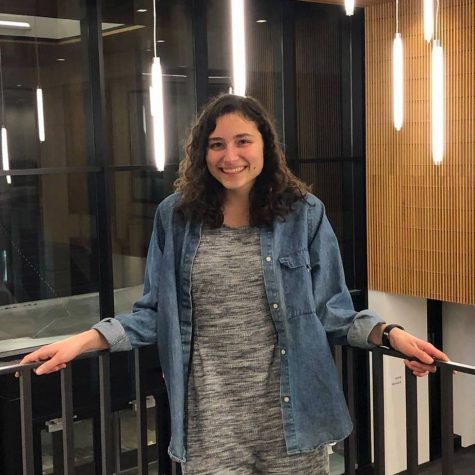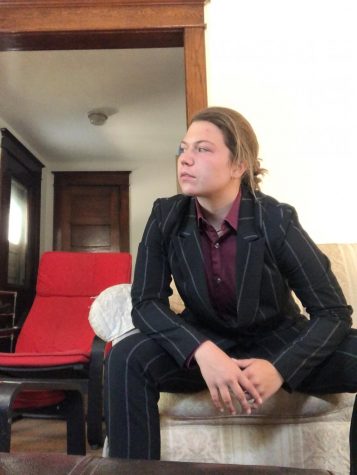Divestment proposal goes before board of trustees

April 29, 2021
Last week, Macalester’s Social Responsibility Committee (SRC) finished its review of Fossil Free Macalester’s (FFM) proposal for the college to divest from Enbridge. The SRC voted unanimously to recommend the proposal to the Macalester Board of Trustees, clearing the way for the board to consider the proposal.
Chair of the Board of Trustees Jerry Crawford ’71 estimated an October vote for the proposal in an email to The Mac Weekly.
“The SRC took about 65 days to come up with their analysis and if we follow a similar timeframe we will be ready for an October… decision,” Crawford wrote.
President Suzanne Rivera announced that she had forwarded the proposal to the board of trustees on Tuesday, April 20. The divestment proposal calls on the board to end its investments in Enbridge, to publicly denounce Line 3 and to increase transparency around the College’s endowment.
“We think both divestment and denouncement… are warranted, and we do not see any other alternative means that would address the relevant concerns,” the SRC wrote in its recommendation.
The next step in the process, as outlined in the Guidelines for Investor Responsibility, is for an ad-hoc committee of the board of trustees to consider the proposal. Crawford started putting together that ad-hoc committee earlier this year, in anticipation of the SRC’s recommendation. Crawford wrote in an email to The Mac Weekly that the committee will start meeting in the coming days.
Throughout the process, Fossil Free Mac students have stressed the urgency of divestment from Enbridge. The Line 3 project is slated for completion before the end of the year and the pipeline could be in use as early as October 2021. With the pipeline operating on that timeline, the students hope the board will vote on the proposal at its May meeting.
That timeline would make for a much quicker process than the last divestment proposal, which the board voted on in October 2019, a year and a half after the SRC recommended it in April 2018.
Sasha Lewis-Norelle ’21, a Fossil Free Mac leader and author of the proposal, hopes the board will make a decision sooner.
“If they delay it until then, it loses a lot of its significance,” Lewis-Norelle said. “We recognize that it is a lot quicker of a timeline than the first proposal, but… this is also a much more straightforward ask in a lot of ways.”
The first FFM proposal in 2019 asked for the college to place a moratorium on private oil and gas partnerships. In October 2019, the board agreed to let existing fossil fuel partnerships expire and to only begin new partnerships in the industry if the investment is reasonably likely to result in a net decrease in greenhouse gas emissions. This proposal is asking for divestment from Enbridge — one company instead of several.
The SRC finished its work ahead of its end of semester deadline. Environmental studies department Chair and SRC Chair Roopali Phadke said that the SRC kept the timeline in mind through its review of the proposal.
“There was a sense of urgency, because this is an ongoing process and we wanted to be able to capture our work while students and faculty and staff are still on campus,“ Phadke said. “I think it was expedient, but I don’t think it was rushed.”
The Guidelines for Investor Responsibility charge the SRC with identifying “grave social injuries” that merit divestment; the report cited two. The first is infringement on tribal sovereignty — Enbridge’s Line 3 pipeline crosses the Fond du Lac reservation and more Ojibwe treaty territory.
“Continuing to benefit from our investment in Enbridge, despite the grave social injury the Line 3 pipeline project inflicts on Indigenous people in northern Minnesota, does not seem to us to be in the spirit of the College’s commitment to challenging ongoing settler colonialism,” the SRC wrote in its report.
The SRC also identified violence against Indigenous women as a grave social injury. Pipeline projects, which bring a large and mostly male workforce into construction areas, contribute to the ongoing crisis of missing and murdered Indigenous women; in northern Minnesota, one shelter reported cases of assaults and harassment from Line 3 construction workers.
The SRC also named two more potential grave social injuries: the environmental threat of carbon emissions and the pipeline’s potential for oil spills. While Line 3 is still under construction and neither of those ethical transgressions have happened yet, the SRC noted that both are likely to happen.
“While they are potential, they are still probable,” Phadke said. “We know what science tells us about the long term impacts of continued fossil fuel usage. We know from other historical examples about the impacts to ecosystems from pipeline development, so it’s not like they’re hypothetical.”
Both the student proposal and the recommendation point out that Macalester’s investment in Enbridge is especially concerning. Macalester students, staff and faculty have been active in opposing Line 3 construction, and the project’s route just a couple of hours north is close to home for many in the Macalester community.
Emma Harrison ’21, a leader of Fossil Free Mac and an author of the proposal, emphasized that regardless of the proposal’s fate, students and other Macalester community members will continue to be involved with the Stop Line 3 movement. She noted that a number of students are planning to spend significant time in northern Minnesota this summer.
Harrison was glad to see the SRC support the proposal and finish its work ahead of schedule.
“I was grateful for the things that they added and addressed that I think really supplemented what we wrote,” Harrison said. “The more skeptical thing is what the board will do.”
In addition to the proposal’s asks for divestment and denouncement of the Line 3 pipeline, Fossil Free Mac asked for increased transparency about the college’s finances from the board of trustees. The SRC backed up this request as well.
“Learning more about the structure of the endowment was important for us, and I think it’s just basic knowledge most faculty, staff or students don’t don’t have and don’t understand,” Phadke said.
Looking forward, the authors of the proposal hope that other members of Fossil Free Mac, especially younger members, continue to organize on campus and in the Twin Cities. Harrison added that the climate movement is moving in new directions, away from the “old school divestment” campaign.
“What happens from the momentum of Fossil Free Macalester is… hopefully people find their way into other organizing,” Harrison said. “We’ve just seen so much profound and incredible mutual aid organizing happening on campus in the past few weeks. The Macalester community does not need Fossil Free Macalester’s organizing energy.
“There’s so much going on. The younger students that we work with, who are all brilliant and awesome, are going to keep showing up and doing work both on-campus and elsewhere.”













